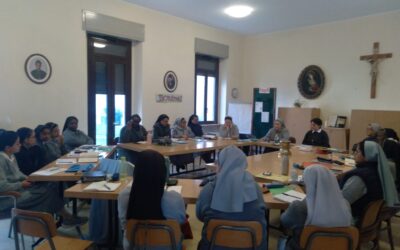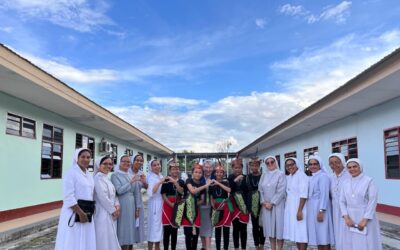India Centre
Brief history of the Province
PROVINCE OF SAN FRANCESCO SAVERIO, INDIA-CENTRE
In 1889, five brave Canossian Sisters set sail from Hong Kong, embarking on a two-month journey filled with challenges and uncertainty, to bring their mission of love and service to India. Defying immense financial challenges and limited resources, M. Maria Stella, the bold and pioneering Superior of the Missions in Hong Kong, fearlessly sent five Sisters on a mission to Belgaum via Cochin. Undeterred by the odds, the Sisters pressed on and on April 8th, 1891, they triumphantly arrived in Belgaum, establishing the first daring foundation of the Province igniting a flame of service that would soon spread across India.
As more communities were established throughout India, these houses were grouped into two regions. In 1947, they were organized into one Delegation with its headquarters in Bombay (now Mumbai). By 1966, the Delegation had been elevated to a Province.
With further growth in the number of foundations, in 1988, the original Province was divided into three:
- India-Centre, with 21 houses
- India-South, with 18 houses
- India-North, with 14 houses.
Since 1988, the Province of St. Francis Xavier, India-Centre has expanded across five western Indian states: Maharashtra, Gujarat, Goa, Karnataka, and Madhya Pradesh, with a combined population of approximately 353.7 million (2023-2024). The official languages of these states are Marathi, Gujarati, Konkani, Kannada, and Hindi, while English is widely used for commerce and administrative purposes.
Context and Challenges:
India is a land of rich cultural diversity, with a multitude of languages, religions, ethnicities, and social customs. However, despite its economic growth, 80% of the population lives in rural areas, many dependent on agriculture. Inequality in wealth distribution has left a significant portion of the population in poverty.
The Province, like the rest of India, has faced challenges from rising religious fundamentalism and fanaticism, including atrocities against Christians. These issues are further compounded by corruption, communal riots, and human rights violations, which challenge the Canossian ministries to foster unity, justice, and peace.
Structure and Ministry:
As of October 2024, the Province comprises 198 Sisters, of whom 17 are temporary professed. There are 3 Novices and 1 Postulant undergoing formation. The Province is made up of 30 communities:
- 18 small communities
- 4 medium-sized communities
- 4 large communities
- 4 Apostolic Groups
These communities are spread across 8 dioceses in 5 Indian states, with 11 communities located in rural areas, primarily serving scheduled tribes and scheduled castes. Since the division of the Province in 1988, 11 communities have closed and 13 new communities have opened in response to the pressing needs of the poorest of the poor.
Interculturality: A Hallmark of the Province
Interculturality is a defining hallmark of the Province of St. Francis Xavier, India-Centre. The Sisters live in a deeply intercultural context, reflecting the diversity of India itself. They come from various cultural, linguistic, and ethnic backgrounds, representing different states, traditions, and communities.
This diversity enriches the Province, where Sisters live together in faith and charity, learning from each other’s unique perspectives and experiences. The mixture of cultures, languages, and age groups creates a dynamic environment where interculturality is more than coexistence—it becomes a spiritual horizon. The Sisters celebrate their differences and weave them into the fabric of daily life, making cultural integration an essential part of their mission and community living.
Living in an intercultural context allows the Sisters to better understand the needs of the diverse populations they serve, particularly in rural and tribal areas. Their commitment to interculturality also helps them foster unity and peace, as they witness the possibility of harmony amidst diversity.
Mission and Vision:
The Sisters engage in a wide range of ministries, including:
- Formal and non-formal education
- Pastoral care of the sick
- Evangelization
- Social outreach and networking
- Youth ministry and vocation facilitation
- Justice, Peace, and Integrity of Creation (JPIC)
- Interculturality, Interreligious Dialogue, and Ecumenism and
- Formation of lay people
The Province’s mission reflects St. Magdalene of Canossa’s desire to “above all make Jesus known and loved,” especially among the poorest. The diversity within the Province is seen as a gift, with each Sister’s temperament, strengths, and experiences woven together in harmony. The Province actively engages in ministries that promote justice, peace, and human dignity, touching lives with God’s love.
God be praised for all the wonders He has worked in our Province.
News
Testimonies from the Meeting of Sisters under 55 years old on the theme: “CALLED TO REVIVE THE GIFT OF GOD, NOW ‘IT IS OUR TURN’”
Testimony of Mother Tina as told by Sr. Leny In Vimercate, the historic home of the missionary sisters, the quarterly meeting dedicated to the sisters under 55 years old was held: 20 sisters from 8 different countries gathered together, coordinated by Mother Tina and...
First Juniors’ Intensive Formation Session in Baucau
From March 23 to 29, 2025, twenty-two junior sisters from East-Timor took part in a week-long intensive formation program held in the Canossian community of Baucau. The program’s theme was: “Formation for Integration with Christ Crucified: Living My Identity as a...
Indonesia: canonical visit
On Sunday 23th February 2025, we joyfully welcome Sr. Sandra, Sr. Melissa and Sr. Josemary in Indonesia as we begin this Canonical Visit, a time of grace and renewal for our Province (Divine Mercy Province-Indonesia). We are also looking forward to the presence of Sr....



